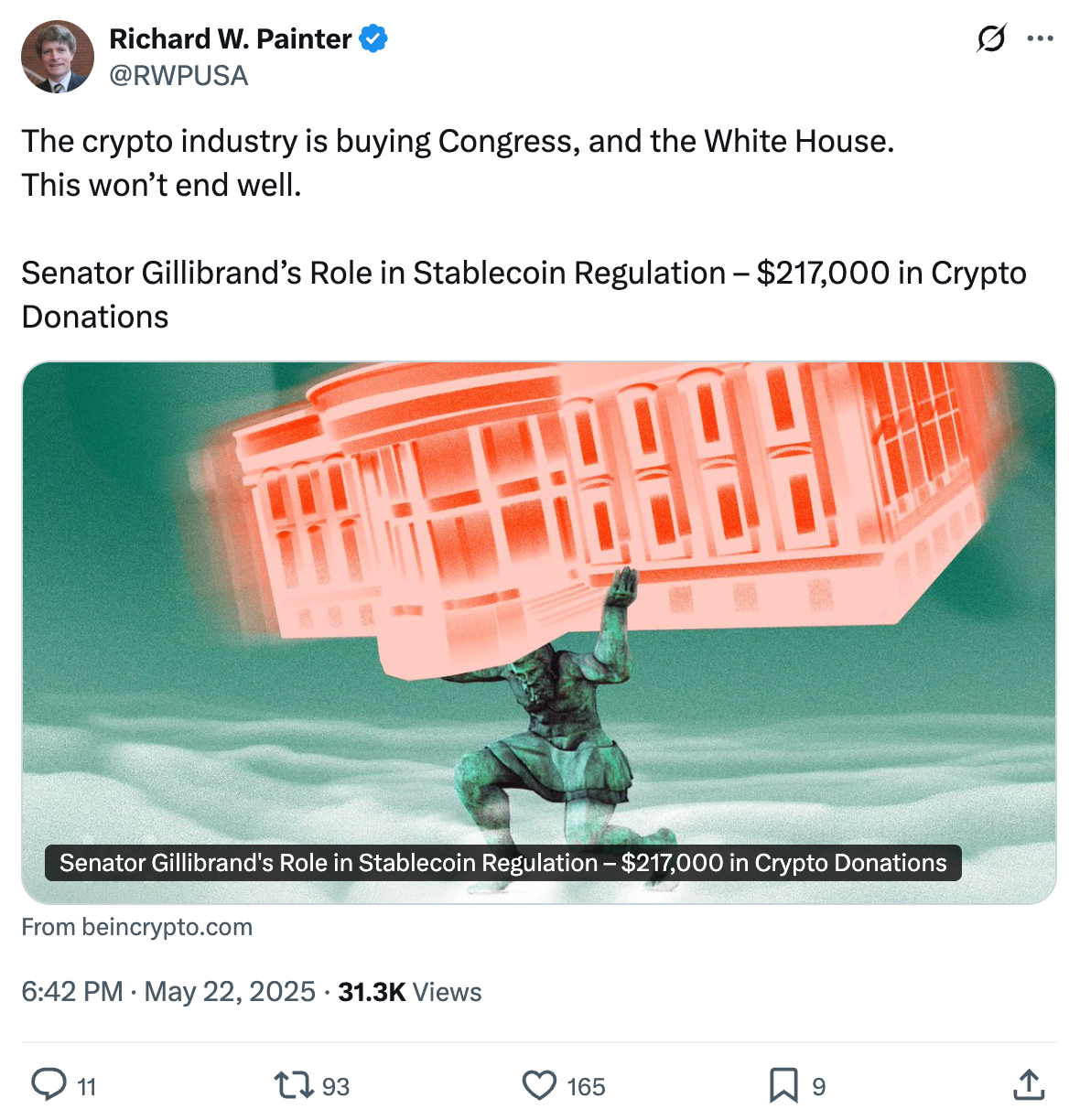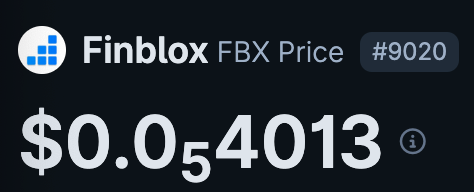Crypto firms hope putting a blockchain veneer on traditional equities will allow them to sidestep lessons learned in the 1929 Wall Street crash, crypto firms look to become banks, and Congress celebrates crypto surveillance while claiming to outlaw it


Issue 88 – The stockchain
Listen to me read this post here (not an AI-generated voice!), subscribe to the feed in your podcast app, or download the recording for later.
The crypto world has two recent buzzwords: “tokenization” and “real-world assets” (RWAs). Gone are the days when crypto evangelists dreamed of tearing down traditional financial institutions altogether. Now, crypto firms seem intent on replicating the financial system, minus regulations that might safeguard consumers or economic stability. Next in their sights? Stock exchanges.
Prominent crypto firms such as Robinhood, Republic, Coinbase, and Kraken are rapidly moving towards “tokenizing” traditional stocks, and pressuring regulators to allow it. Instead of buying your shares of publicly traded firms via a brokerage account that places orders on the NYSE or Nasdaq, you would use a crypto trading app to purchase a token representing a share. Companies hoping to develop such platforms usually promote the idea by saying that a blockchainified stock market would expand trading hours, and would be more accessible to international investors who didn’t want to go through the somewhat onerous process of opening an American brokerage account.
These companies don’t usually admit that, by encasing stocks in a blockchainy wrapper, they hope to tap into lucrative equities markets while sidestepping the expensive compliance and oversight requirements of traditional American brokerages and exchanges. This fits the long history of companies trying to use blockchains as a magic get-out-of-regulation-free wand, reminiscent of the 2017 bubble when companies used “initial coin offerings” (ICOs) to try to sidestep IPO regulations. Indeed, Robinhood has been heavily lobbying for “a new regulatory approach [that’s] needed to allow tokenization to flourish” and not “stifle growth and innovation”.1 Regular readers of this newsletter will recognize this language as the standard rhetoric of a crypto company asking for carveouts and exemptions from regulations we collectively learned are necessary, oh, about a century ago — when a speculative bubble emerged around stocks sold to the public based on false or incomplete information and we wound up in the Great Depression.
Some companies have gone even further, tokenizing shares in private companies. When Robinhood announced its tokenized equities offering (only available to European investors at the moment while the company works on lobbying US lawmakers and regulators), they also announced that they had tokenized shares in the private companies SpaceX and OpenAI. This prompted concerns from European regulators and OpenAI themselves, who tweeted: “These ‘OpenAI tokens’ are not OpenAI equity. We did not partner with Robinhood, were not involved in this, and do not endorse it. Any transfer of OpenAI equity requires our approval—we did not approve any transfer. Please be careful.”23
Money Stuff’s Matt Levine put it well in his must-read newsletter on the topic when he wrote:
The “legal friction” [Robinhood mentions] is that some companies are private because they do not want to comply with securities disclosure rules, and tokenization’s solution is that they can sell stock to the public without complying with those rules. ... Saying “we should get rid of the disclosure rules” sounds bad, retrograde, greedy. Saying “tokenization” sounds good, modern, cool.Crypto companies already barreling forward with blockchainified stocks have hit some resistance from someone they may not have expected: SEC Commissioner Hester Peirce, who has otherwise been such a staunch ally of the crypto industry that she earned (and embraced) the moniker “Crypto Mom”. On July 9, she cautioned, “As powerful as blockchain technology is, it does not have magical abilities to transform the nature of the underlying asset. Tokenized securities are still securities.”4 While this is temporarily reassuring, bills like the CLARITY Act, currently making their way through Congress, threaten to undermine the SEC in this area. In a July 9 Senate Banking Committee hearing, former CFTC Chairman Timothy Massad agreed with Ranking Member Elizabeth Warren that the bill “could undermine [the SEC’s] authority substantially”, effectively turning blockchains into the regulatory escape hatch the industry desires.5
Thanks to everyone who’s filled out the Citation Needed reader survey! If you haven’t yet, I’d love your input — it helps me keep writing a newsletter worth your time.
In government
Crypto was an afterthought in Congress these past couple weeks as lawmakers battled it out over the budget reconciliation bill, but it’s back with a vengeance as House Republicans have formally declared next week to be “Crypto Week”.6 The House is pushing for a vote on the GENIUS Act stablecoin bill, which already passed in the Senate, and they’ve stopped trying to advance their own STABLE Act after urging from Trump [I86]. The house will also be considering the CLARITY Act market structure bill [I85], and a bill called the Anti-CBDC Surveillance State Act.
CLARITY Act
The CLARITY Act may face more resistance than GENIUS, with Ranking Member Warren decrying it as “another industry handout that gives the crypto lobby exactly its wish list”. Former CFTC Chairman Massad dubbed it “236 pages of regulatory arbitrage opportunities for creative lawyers”.7 Law professor Richard Painter warned: “The risk is that we repeat the experience of regulating the banks in the 1920s and the Depression that followed. 10 years of depression. The risk is that we repeat what happened in 2008, when campaign contributions poured into Congress from the securities-based swap industry, elsewhere in the financial services industry, and we had decades of deregulation. The economy collapsed. Millions of American families losing their homes, people unemployed. We’ve been through this again and again.”8
Republican Senators spent considerable time during the hearing chastising witnesses and fellow legislators alike for daring to mention the crypto lobby’s influence. Senator Kennedy (R-LA) spent about half of his allotted time demanding that Professor Painter apologize to Senator Gillibrand (D-NY), claiming he called her a “crook” on Twitter back in May.
0:00
/1:43
Kennedy was kind enough to read the tweet aloud, serving to both clarify that Painter never described her as such, and ensure that the official record now reflects Painter’s perfectly accurate tweet:
 (Tweet)
(Tweet)If Kennedy thinks accepting crypto money makes one a crook, well, perhaps he should do something about that. (Kennedy himself accepted almost $40,000 in 2024, all from Cumberland DRW’s Donald Wilson. This relatively low amount compared to other crypto-backed Congresspeople is likely because Kennedy was not up for re-election in 2024.)
Evidently angered by Painter’s refusal to take the bait and his requests that they actually discuss the proposed bill instead of wasting time mischaracterizing tweets, Kennedy lashed out: “You’re a whackjob. You are a major league, next-level whackjob.” At the end of the hearing, Chairman Tim Scott proclaimed, “I hope we all remember very clearly that our words are containers of power”, going on not to rebuke the Senator for attacking a witness as a “major league, next-level whackjob” but instead those who “weaponize[d words] against Senator Gillibrand or President Trump”. (Notably, Painter did not bring up Gillibrand; it was Kennedy who printed out Painter’s tweet to read at the hearing.)
Anti-CBDC bill
The rather alarmist-named Anti-CBDC Surveillance State Act exemplifies the peculiar Republican stance on digital currency surveillance. They’ve somehow convinced themselves that Federal Reserve banks are poised to launch a CBDC (central bank digital currency) that would enable mass surveillance — though no such plan has been seriously proposed. Somehow, preventing this imaginary threat takes priority over addressing things like the president’s own stablecoin, which has already given him the types of surveillance and control powers they fear in CBDCs. Indeed, those concerns have mostly come from the Democratic wing of Congress, and have been brushed off by Republicans who are largely terrified to criticize anything Trump does.
And while Republicans decry purely hypothetical CBDC surveillance, they celebrated crypto’s actual surveillance capabilities at the recent Senate hearing, where Senators and crypto executives alike delighted in how blockchains’ public ledgers ease tracing by law enforcement and, frankly, anyone else. Conveniently, recording all transactions publicly means law enforcement no longer needs to obtain a pesky subpoena to peek in on your financial activities!
Senator Tim Scott (R-SC): [C]rypto companies are helping law enforcement track illicit activity with greater precision than traditional finance allows. ... Blockchain technology creates a permanent traceable ledger that can help law enforcement catch those bad actors. I've said it before, so I'll say it again: It's far easier to track something that has a digital footprint than something that does not.Senator Katie Britt (R-AL): And transactions on the blockchain offer a unique ability for tracing and tracking, including analyzing trends on the ledger.
Brad Garlinghouse, Ripple CEO: I think the good news has been in many cases [bad actors] don't often understand how traceable and trackable [using digital assets] actually is and it's more trackable than, obviously, cash.
Back in 2023, I wrote a tweet thread about how “the past ~month or so i’ve suddenly started seeing a bunch of people in crypto and in the financial regulatory/enforcement world who are unironically excited about crypto because of the financial surveillance it could empower, and that scares the shit out of me.” I mentioned listening to a panel about how “algorithms” could detect criminal activity on public ledgers in real time to automatically alert law enforcement, or even be programmed into the money itself to stop transactions. The dystopian future I worried about then is now being celebrated in Congress as a feature.
In the White House
Research by Citizens for Responsibility and Ethics in Washington (CREW) reveals that 19 White House officials own between $875,000 and $2.35 million in crypto assets such as bitcoin and Ethereum, standing to directly profit from President Trump’s March executive order directing the establishment of national crypto reserves [Crypto reserves]. One of them, Special Assistant to the President for Communications Ian Kelley, holds all five of the assets Trump mentioned by name in social media posts as likely candidates for the stockpile.9
Trump business interests
Remember Aqua 1 Foundation, the firm I mentioned last issue had bought $100 million of the Trump memecoin [I87]? A new report by Jacob Silverman in The Nation questions: “Does Trump’s Biggest Crypto Backer Really Exist?” “It’s unclear where the real money powering this deal originated,” he writes. “It’s possible that Aqua 1 Foundation is a real Emirati company, but it’s just as possible that it could be a front for any number of foreign financial or political interests seeking favors from Trump.”10
Meanwhile, shady crypto billionaire Justin Sun apparently doesn’t want to be outdone by Aqua 1, and has pledged to spend another $100 million, this time on the Trump memecoin, to secure the spot of Trump’s number one benefactor bestie.11 Adding to his $75 million of WLFI tokens, and the around $38 million he or his company already spent on the Trump memecoin, this would put the total amount of Sun’s Trump-related token purchases at roughly $213 million.
Most Trump memecoin buyers are not buying directly from Trump-affiliated entities, but on the secondary market, meaning that while Trump entities may earn some profit from trading fees, they’re not profiting directly from the token sale. However, the timing of Sun’s announcement — a little over a week before the first tranche of memecoins held by Trump-affiliated entities are due to unlock for sale — means that it’s possible Sun plans to purchase the tokens directly from one of those entities. So far, at least $56 million of Sun’s money has gone directly to Trump himself (via his trust) or Trump family members; that number could nearly triple if they are the ones selling him the tokens.
As I wrote in November, shortly after Trump’s World Liberty Financial opened its WLFI token sale:
[The token has] strict limitations around token resale and remuneration to token holders, and availability only to accredited investors — limitations which were rather obviously crafted to try to dodge securities enforcement. If Trump succeeds with his plans to defang the SEC, I expect these limitations to swiftly change — likely significantly financially benefiting Trump and his family, who receive 75% of net protocol revenues in addition to their initial allocation of 22.5 billion $WLFI tokens.Well, wouldn’t you know it, the team behind World Liberty has just proposed lifting the restrictions to allow WLFI to be resold.12 As with many other crypto businesses lately, they haven’t even bothered to wait for crypto legislation to pass in Congress, and are instead relying on the paralyzed SEC not to enforce existing law.
Although World Liberty has yet to actually release any of the software they claim they’ve been developing since September, they say that allowing secondary sales of the token will “bring us one step closer to building a more open, transparent, and powerful financial system”. It seems to me like actually building some software might be a bigger step, but hey, I guess cashing in on the token takes priority. This proposal, which has so far received overwhelming support, could be very lucrative for people like Sun and, of course, the Trumps.
Trump Media & Technology Group, the majority Trump-owned company behind Truth Social, has filed to list a “Truth Social Crypto Blue Chip ETF” tracking a portfolio of bitcoin, Ethereum, Solana, Ripple’s XRP, and Crypto.com’s CRO.13 The first four tokens make sense for a fund claiming to represent “blue chip” cryptocurrencies, as those are some of the most highly traded cryptocurrencies. The odd one out is CRO, which is likely only included because Truth Social is partnering with Singaporean crypto exchange Crypto.com for custody services. While many applications have been filed, no ETFs have yet been approved involving crypto assets besides bitcoin or Ethereum.
Truth Social also announced that it will be rolling out “gems” on Truth Social, which it promises will “eventually” be connected to a “utility token”.14 This is part of a new $9.99/mo subscription TV streaming plan it’s calling the Patriot Package, which adds another 12 “premium, non-woke news channels” (like Newsmax and OANN) to the list of 27 (like Real America’s Voice and Lindell TV) in the Truth+ free plan.
In regulators
Crypto firms Circle, Ripple, and BitGo have applied for National Trust Bank charters, which, if approved, would insert them directly into the heart of the traditional financial system.15 “Stoking the system with banks heavily linked to venture capital and crypto could be a terrible idea, however,” wrote Bloomberg columnist Paul J. Davies in what could be the understatement of the year. At least these charters do not automatically grant banks access to master accounts (although it enables them to request access), nor do they allow them to take demand deposits or engage in lending.16
These charters, granted by the Office of the Comptroller of the Currency, have historically been hard for crypto firms to obtain, so they have instead resorted to trying to worm their way into the banking world in weird ways like by buying tiny rural banks. But shortly after these firms applied for charters, the Senate confirmed former blockchain executive Jonathan Gould as Comptroller of the Currency.17 In addition to approving banking charters, the OCC will oversee stablecoin issuers under the proposed GENIUS Act: likely motivating these applications by stablecoin issuers Circle and Ripple and “stablecoin-as-a-service” company BitGo, which custodies the reserves for Trump’s USD1 stablecoin.
Another bank called Erebor, which as you might guess by the Lord of the Rings name is backed by Peter Thiel, Joe Lonsdale, and Palmer Luckey, has also applied for a bank charter. According to the Financial Times, the new bank will aim to “fill the gap left by Silicon Valley Bank” — the tech startup-focused bank that failed in March 2023.18 Around 85% of Silicon Valley Bank’s deposits, mostly belonging to venture capitalists and venture-backed tech companies, were uninsured; the FDIC nevertheless covered those uninsured depositors and spent $20 billion on the whole boondoggle.19 As is so often the case with “tech visionaries”, yesterday’s warning lesson is tomorrow’s blueprint.
SEC
The whole tokenized stock thing is earning a mixed reception from traditional financial firms and from regulators. While SEC Commissioner Hester Peirce wrote that “Tokenized securities are still securities”, SEC Chairman Atkins said in a CNBC interview that “tokenization is an innovation, and we at the SEC should be focused on how do we advance innovation in the marketplace”.20
The Securities Industry and Financial Markets Association (SIFMA), a major trade group for securities firms, banks, and asset management companies, sent a letter to the SEC regarding reports that crypto firms were seeking no-action letters or exemptive relief from the SEC for tokenized equities, urging them to reject the requests and instead engage in public policy discussions. These requests, if granted by the SEC, would allow companies to engage in activities that are either in an uncertain regulatory state or prohibited by securities laws. SIFMA raised concerns over “fundamental questions as to how investors would be protected”, and opined that “Allowing certain entities to operate platforms outside of this framework raises significant policy questions and regulatory arbitrage concerns”.21 Some in the crypto industry bashed SIFMA for the letter, with Paradigm VP of Government Affairs Alexander Grieve tweeting: “TL;DR: they hate [tokenized stocks] & want to protect their market position. ... The old gods of finance do not share power lightly.”22
In elections and political influence
Reeling from a dramatic breakup with President Trump and furious at the budget reconciliation bill, Elon Musk declared he would start a new political party called the America Party. As Lyz from Men Yell at Me writes, “The man who gave us the first AI chatbot to go full Hitler and a truck so ugly your grandma has been protesting it from her nursing home has decided to invent something else: a new political party.”23
Musk claims it will represent “the 80 percent in the middle” of the political spectrum, though this seems unlikely given statements suggesting that the party’s platform will mirror his personal political views, which are decidedly not centrist. Asked on Twitter, “Will America Party embrace Bitcoin?”, Musk replied: “Fiat is hopeless, so yes”. Whether this new pro-bitcoin party will actually emerge, or Musk will be distracted by the next shiny thing to pass within his field of vision, remains to be seen.
In the courts
A Nigerian scammer impersonating Steve Witkoff and the Trump-Vance Inaugural Committee tricked a donor into sending him $250,000 [W3IGG]. The actual Witkoff, a longtime Trump ally now installed as the US special envoy to the Middle East despite having no diplomatic experience, was at the time co-chair of the Presidential Inaugural Committee. He and his sons are also deeply involved in Trump’s World Liberty Financial crypto business. Using the classic “lowercase Ls look like uppercase Is” trick, a scammer obtained the email address steve_witkoff@t47lnaugural.com and used it to solicit a quarter million dollars from “Ivan & Mouna” in an email sent on December 24. As Claire Heddles at NOTUS observed, these just so happen to be the first names of the MoonPay crypto platform’s CEO and CFO, and the transfer came from a crypto wallet belonging to MoonPay.24 MoonPay had told Fox Business days before the transfer that they planned to contribute an undisclosed amount to the inaugural fund.25 In a surely coincidental development, MoonPay would be chosen only weeks later by Trump’s memecoin endeavor to handle payment processing. MoonPay boasted that they had “onboarded 750,000 new consumers” thanks to the partnership.
The FBI recovered $40,353, about 16% of the stolen funds, through seizure requests to Tether and Binance.26 Mark Hays, a cryptocurrency reform advocate with Americans for Financial Reform and Demand Progress, told NOTUS that if MoonPay was indeed the victim in this incident, “that smacks of favoritism or selective enforcement. ... If you’re friendly with Trump and you’re a Trump crypto bro, you get the DOJ proactively trying to recover your assets, even when there are not too many zeroes on a rounding sheet. But if you’re an average consumer and you lose your life savings because of a memecoin fronted by those same people, no one’s going to help you.”24
The city of Detroit has sued RealT, a “tokenized real estate” firm that purchased hundreds of rental properties across the city and sold fractionalized shares to foreign investors. They’ve also caused hell for renters and the city — failing to maintain the deteriorating and unsafe properties; refusing to pay bills, taxes, or tickets; and trying to dodge the law using 165 corporate entities.27
In bankruptcies
The FTX estate has asked to pause repayments to creditors based in 49 countries while they evaluate whether it’s legal to distribute funds to them. Some of the countries on the list, such as North Korea, Iran, and Cuba, are subject to US sanctions; others have laws restricting crypto transactions. According to FTX, residents of the potentially restricted countries hold around 5% of the value of all potentially allowed claims, with 82% of the potentially restricted claims belonging to Chinese creditors. FTX has proposed retaining attorneys to evaluate the feasibility of repaying residents of each jurisdiction. If it’s not feasible, after an objection period, FTX may forfeit payouts to residents of that jurisdiction.28
A lawsuit by the bankrupt Celsius platform against offshore stablecoin issuer Tether has survived a motion to dismiss. Celsius alleges that Tether sold off 39,500 BTC held as collateral for a loan in a “fire sale” at lower-than-market prices to recoup the loan, violating their lending agreement.29 Some headlines have described this as a $4 billion lawsuit, based on the idea that that amount of bitcoin would be worth around $4 billion at today’s (substantially higher) prices. However, even if Tether did violate the lending agreement that required them to provide Celsius with ten hours to come up with additional collateral to avoid defaulting on the loan, it seems unlikely to me that Celsius would have been able to do so if given the opportunity. Celsius was on fire and spiraling towards bankruptcy at the time, failing to repay other loans, and I’m not sure where they’d have found said collateral.
It’s an interesting lawsuit for a separate reason, though: Tether failed to convince the judge that the claims were an “impermissible extraterritorial application” of bankruptcy laws to a company based outside of the US. A lawyer speaking to DL News described the ruling as “a pivotal moment that could potentially reshape the legal landscape for cross-border cryptocurrency disputes”.30
Outside the US
The EU’s financial oversight body is reviewing Malta’s adherence to the EU’s Markets in Crypto Assets (MiCA) regulations, after the small island country fast-tracked the authorization of a crypto firm despite “material issues [that] remained unresolved or pending remediation at the time of the authorization.” CoinDesk has theorized the unnamed firm might be the Seychelles-based OKX crypto exchange, which was granted pre-authorization by Malta shortly before reaching a $500 million settlement in a US criminal case [I78].31
Elsewhere in crypto
Sad news, folks: another planned crypto island bites the dust. This one is Satoshi Island, which I mentioned briefly all the way back in Issue 6 when I was interviewed for an ABC (Australia) article about it. This one had its sights set on Vanuatu, an island northeast of Australia and west of Fiji. Naturally, Satoshi Island sold a bunch of their “Land Deed NFTs” before actually building any of the stacks of modular homes depicted in digital renderings, and they never seemed to tackle the problem that the land they were “selling” to NFT holders couldn’t actually be sold. In January 2022, the Vanuatu Financial Services Commission warned the project “could be a scam”. Now, the Satoshi Island Twitter account has announced the termination of the agreement between Vanuatu and Satoshi Island, seemingly due to Satoshi Island’s failure to actually develop the project. Fear not, they’re “currently exploring a voluntary buyback”. Hopefully they’ll work on that a little harder than they did the island residences.
They’re not the only crypto project to shut down recently. Three years after stopping withdrawals [W3IGG] in the wake of the Three Arrows Capital blowup [W3IGG], crypto yield farming project Finblox is officially pulling the plug. They’d drawn in customers with promises of “up to 90% APY on your crypto!”, and even claimed that deposits were insured up to $45 million. It turned out they (along with what seemed like half of the crypto industry) were issuing uncollateralized loans to the Three Arrows Capital hedge fund, which I’m sure was working out great for them while the number was going up only. After the crisis, Finblox converted customer funds into a Finblox-issued token called FBX, which is now trading at a price so close to zero that crypto trackers resort to using scientific notation.

Finblox founders maintain that they clearly explained the FBX conversion to customers, who then opted in, but some customers say they never agreed to it.32
The Web3 is Going Just Great recap
There were five entries between July 1 and 11, averaging 0.5 entries per day. $44.45 million was added to the grift counter.
- MoonPay apparently gets scammed out of a $250,000 donation to Trump inaugural fund [link]
- Kinto token crashes; community claims rug pull, Kinto claims hack [link]
- $2.2 million in user funds stolen from Texture; hacker returns 90% [link]
- Security researchers disclose exploit that put over $10 million across multiple protocols at risk [link]
- GMX exchange hacked for $42 million [link]
In the news
Worth a read
Also, if you’re interested in my fiction reading recommendations, I published my June reading recap to TikTok and YouTube. I’ve been trying to do one of these every month since March; they’re all on Tiktok and in a playlist on my YouTube channel if you’ve missed the previous ones.
That's all for now, folks. Until next time,
– Molly White
Have information? Send tips (no PR) to molly0xfff.07 on Signal or [email protected] (PGP).
I have disclosures for my work and writing pertaining to cryptocurrencies.
References
Letter Re: Tokenization of Real-World Assets, submitted by Robinhood to the U.S. Securities and Exchange Commission on April 25, 2025. ↩
“Robinhood stock tokens face scrutiny in the European Union after OpenAI warning”, CNBC. ↩
“Enchanting, but Not Magical: A Statement on the Tokenization of Securities”, U.S. Securities and Exchange Commission. ↩
“From Wall Street to Web3: Building Tomorrow’s Digital Asset Markets” Senate hearing, timestamp 1:39:00. ↩
House Announces Week of July 14th as “Crypto Week”, French Hill press release. ↩
“From Wall Street to Web3: Building Tomorrow’s Digital Asset Markets” Senate hearing, timestamp 1:11:50. ↩
“From Wall Street to Web3: Building Tomorrow’s Digital Asset Markets” Senate hearing, timestamp 1:56:00. ↩
“White House officials own up to $2.35 million in proposed national crypto reserve assets”, Citizens for Responsibility and Ethics in Washington. ↩
“Does Trump’s Biggest Crypto Backer Really Exist?”, The Nation. ↩
“Proposal: Make $WLFI Token Tradable”, WLFI. ↩
“Trump-Linked Truth Social Plans Crypto ETF as Digital Asset Franchise Expands”, CoinDesk. ↩
“Trump's Truth Social teases 'utility token' tied to user engagement with streaming subscription”, The Block. ↩
“Crypto, Startups and Banking Make a Scary Mix”, Bloomberg. ↩
“Crypto Companies Veer From Debanked to Becoming Bankers”, Bloomberg. ↩
“Senate Confirms Jonathan Gould as Comptroller of the Currency”, Bloomberg.
↩“Peter Thiel joins tech billionaires backing new lender Erebor to rival Silicon Valley Bank”, Financial Times. ↩
“FDIC spent $20 billion to handle Silicon Valley Bank collapse”, The Hill. ↩
“First on CNBC: Transcript: SEC Chair Paul Atkins Speaks with CNBC’s ‘Squawk Box’ Today”, CNBC. ↩
“Requests for Exemptive Relief from the Federal Securities Laws for Tokenized Equities and Other Digital Assets”, SIFMA. ↩
“Dingus of the week: The ‘America Party’”, Men Yell at Me. ↩
“The DOJ Seemingly Outed Top Crypto Executives as Falling for a Nigerian Crypto Scam”, NOTUS. ↩
“Trump inauguration draws big crypto donations”, Fox Business. ↩
Complaint filed on July 2, 2025. Document #1 in United States v. APPROXIMATELY 40,353 USDT.ETH CRYPTOCURRENCY. ↩
“Detroit sues crypto landlord RealT over blight, tenant harm”, Outlier Media. ↩
Motion to authorize filed on July 2, 2025. Document #31148 in In re: FTX. ↩
Memorandum opinion and order filed on June 30, 2025. Document #52 in Celsius Network Limited v. Tether Limited. ↩
“Offshore firms beware — US Judge gives Celsius greenlight to proceed in $4bn lawsuit against Tether”, DL News. ↩
“Europe’s Financial Watchdog Probes Malta Over Fast-Track MiCA Authorizations”, CoinDesk. ↩
“Finblox shutters three years after losing millions of dollars worth of customer deposits”, DLNews. ↩
“Statement on Cryptocurrencies and Initial Coin Offerings”, U.S. Securities and Exchange Commission. ↩
.png)





